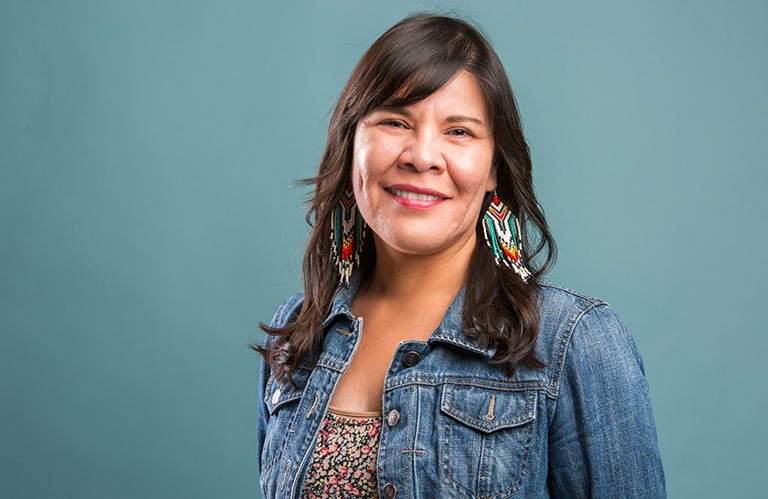Meet Cheyenne Henry, the new manager of Concordia’s Otsenhákta Student Centre
 Cheyenne Henry: “I value storytelling and creative ways of building relationships and community.”
Cheyenne Henry: “I value storytelling and creative ways of building relationships and community.”
“I love working with students.” That passion will undoubtedly benefit Cheyenne Henry in her role as manager of Concordia’s Otsenhákta Student Centre.
Henry, who joined the university in July, leads the centre for First Nations, Inuit and Métis students, collaborating across the university as well as with local Indigenous communities to provide relevant and culturally rich support and programming.
“Cheyenne brings a wealth of knowledge and a sincere commitment to Indigenous student success to this role,” says Allan Vicaire, senior advisor for Indigenous Directions, who had been acting as the interim manager for the centre.
“Above all, I’m excited to see her develop creative collaborations with students and bridges with local communities.”
Henry is a member of Roseau River Anishinaabe First Nation and grew up in Winnipeg. She comes to Concordia with extensive experience working in postsecondary education and student support, as well as working with Indigenous communities in community and economic development, outreach and advocacy.
Prior to joining Concordia, she served as an academic and career advisor for almost 13 years, most recently at Dalhousie University in Halifax. As an advisor, she empowered students to design their own academic pathways, accomplish their career goals and navigate support across the university.
Before that, Henry held various positions in the Department of Urban and Inner-City Studies and the Department of Indigenous Studies at the University of Winnipeg. She also worked in community organizations in Winnipeg’s North End and inner city, supporting Indigenous youth and developing programs for housing, adult learning and families.
Henry is also a multidisciplinary visual artist whose work spans traditional and contemporary art. Her practice is grounded in collaboration with Indigenous organizations, communities and artists, and she has taken part in exhibitions and residencies across Canada.
‘Students need to have a space where they can explore themselves’
What brought you to this role?
Cheyenne Henry: I missed working more directly with my own community, with Indigenous students. There’s such a need to create culturally and spiritually safe spaces for our people. I saw this role as a chance to incorporate new ideas, provide opportunities for students and be part of this decolonizing work more intimately. As an Indigenous person in these institutions, you’re always going to be part of this work anyways, above and beyond what our regular titles are.
It was also these kinds of spaces that gave me a sense of safety and community when I was a student, as a young single mom without a lot of financial support. In university, I had an Indigenous advisor and my cohort of Indigenous students along the way. That was really what helped me be successful as a student; I wouldn’t have made it through my degree without that support.
Tell me about your philosophy in your work with students.
CH: I love working with students. My work has been to help them navigate the spaces and services at the university. I’m coaching, supporting and celebrating them.
University students need to know that they have a say in their education, as they’re exploring programs and career pathways. Above all, their education needs to make sense to them. This approach is beneficial for any student, not only Indigenous students. It’s important for me to take time with students, to share and to build trust. For me to help you as a student, I want to get to know who you are.
You’re also a visual artist. Can you tell me about how that affects your work?
CH: Art definitely impacts the way I work and the way I look at the world around me. I value storytelling and creative ways of building relationships and community. There’s a real power to creative interactions. This could mean connecting with a student while we have a project on the go and creating something together.
In a postsecondary institution, there are things we can do that can help Indigenous students reconcile their learning, like engaging in our culture and arts practices to balance out the Westernized, colonized way of learning. With beading, for example, it keeps the hands busy and always helps to centre me. It’s about finding a balance so that we’re not always so heady.
Can you tell me about your vision in your work with the Otsenhákta Student Centre?
CH: It’s so important for Indigenous students that the support they receive reflects who they are. Students need to have a space where they can explore themselves, explore what education means to them, what community means to them and where that can lead them. I hope we can create a space at Otsenhákta where these types of conversations can happen — with each other, with Elders and through cultural practices — along with providing student support services. To have these conversations, it’s important that we safeguard this space for us.
I also hope that we can incorporate this work and approach across the university. There’s so much value in what we promote as Indigenous people, and we have a lot of knowledge to share. When I think about implementing an Indigenous way of doing, it means working through connections. It means grounding our work in reciprocal relationships and in our interconnectedness.
The Otsenhákta Student Centre will be hosting its annual Pow Wow, open to all, September 15 at the Loyola Campus Quad Space.
Learn more about Concordia’s Indigenous Directions.




